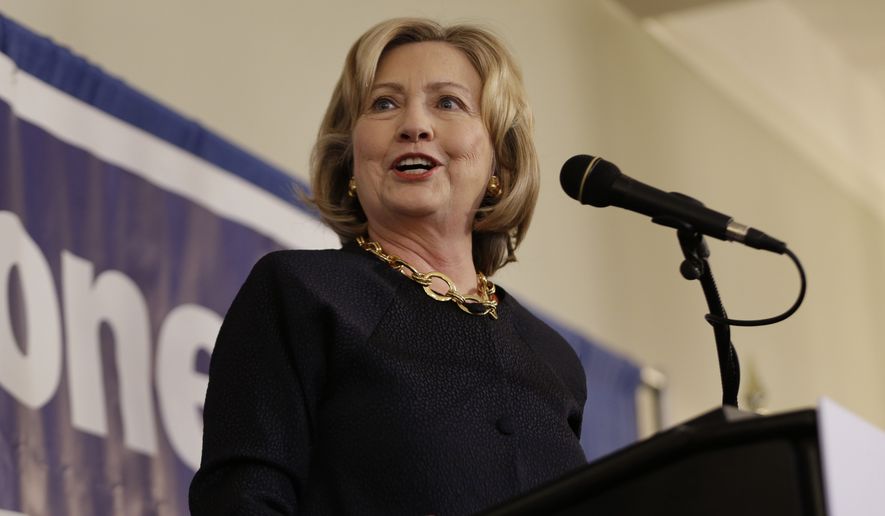OPINION:
Those who live in the spotlight must treat every word they say with the utmost care. A secretary of state could, for example, spark a nasty international incident by mixing up the Republic of China and the People’s Republic of China, two nations that don’t get along. The “reset button” in U.S.-Russian relations aside, Hillary Clinton’s gaffes as the nation’s chief diplomat didn’t encourage many full-scale invasions.
Formal state dinners are staid occasions that encourage careful, well-managed conversation where everyone pretends to be having a good time. Trouble comes when politicians actually make themselves comfortable, as Mrs. Clinton did on Friday when she was surrounded by friends like Sen. Elizabeth Warren of Massachusetts. In such a moment, goaded by the applause of a Boston audience, she heard herself saying: “Don’t let anybody tell you that, you know, it’s corporations and businesses that create jobs.” The room full of capitalists gave a knowing shrug, but her words in support for raising the minimum wage to “create jobs” thrilled supporters of Martha Coakley, the Democratic gubernatorial candidate, who had gathered at the Park Plaza hotel.
Most Democrats who can afford a ticket to listen to Hillary — she often commands more than $30,000 per plate — surely know better. Others might actually believe that the government can create jobs and higher wages merely by proclamation. Who doesn’t want a larger paycheck? How can there be a downside to raising the minimum wage?
Hourly workers who have received a minimum-wage raise know better, too. Businesses that can barely make ends meet, which is most of them these days, have two options if the minimum wage goes up: Cut available jobs or cut hours. Otherwise, payroll expenses soar out of control. But Mrs. Clinton’s words weren’t directed toward the actual working class. Her pandering was meant as a balm for the conscience of wealthy donors. They get to feel less guilty about their good fortune in life by supporting candidates who would order others to pay better wages.
The National Center for Public Policy Research cites Mrs. Clinton’s remarks with a demand for an investigation of her dealings in Russia while she was secretary of state. Earlier this year, David Almasi of the National Center asked Boeing CEO W. James McNerney an impertinent question to enliven a shareholder meeting: Why did the aerospace giant send a check for $900,000 to the Clinton Foundation shortly after making a $3.7 billion deal with Russia?
Mrs. Clinton played a key role in bringing the parties together at an event in Moscow with Sergey Kravchenko, Boeing’s top man in Russia. “We’re delighted that a new Russian airline, Rosavia, is actively considering the acquisition of Boeing aircraft,” said Mrs. Clinton on that occasion. “And this is a shameless pitch for Rosavia — I’ve said what you wanted me to say, Sergey — to buy Boeing aircraft. Right?”
The pitch worked, but Mr. McNerney deftly dodged the issue, saying Mrs. Clinton would surely have advocated on behalf of any major company, such as Caterpillar or GE, if it meant creating jobs. No doubt. Except that Mrs. Clinton wasn’t shilling for other companies, just the company that gave what looked an awful lot like a love offering to the Bill, Hillary and Chelsea Clinton Foundation.
Such crony deals, or the appearance of cronyism, is inevitable when the government is run by people who believe, as President Obama does, that “if you’ve got a business — you didn’t build that. Somebody else made that happen.”
Fortunately for Mrs. Clinton, she has another two years to polish a carefully worded response when the moderator of a presidential debate in 2016 asks whether businesses create jobs.




Please read our comment policy before commenting.